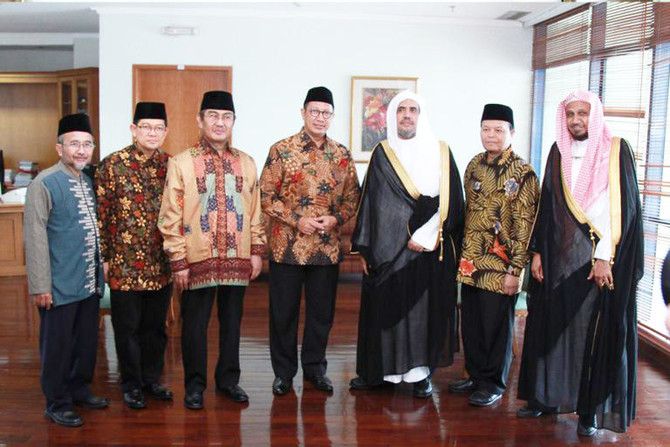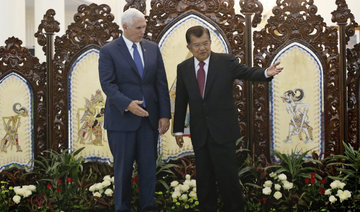JAKARTA: A conference of Islamic scholars from Saudi Arabia, Indonesia and Malaysia on Monday explored the role of universities in strengthening moderate Islamic thought.
They urged Muslim communities to combat religious extremism and societal division by spreading knowledge about moderate Islam.
The conference was organized by the Muslim World League (MWL) and Al-Azhar Indonesia University in Jakarta.
The scholars said intensifying dialogue on moderate Islam will help veer young Muslims away from those who want to destroy the religion, its people and its civilization.
In his opening remarks, MWL Secretary-General Mohammed bin Abdul Karim Al-Issa said a small faction of the roughly 1.8 billion Muslims worldwide has distorted understanding of Islam.
“The majority of Muslims around the world understand the right conception about Islam, except a minority few who have no idea about the core of Islamic teachings,” he said, adding that universities play an important role in rectifying misconceptions about Islam and terrorism.
Daesh “is just a small community in Islam, but it’s widespread due to the proliferation of the Internet. It’s our obligation, including universities, to set the record straight about the real Islamic teachings.”
Jakarta’s Governor-elect Anies Rasyid Baswedan, who was a panelist at the conference, said extremism flourishes when people do not think critically.
“It’s not just religious extremism but extremism in any field, any sector. University is the place to nurture critical thinking and creativity,” said the former rector of Paramadina University and education minister.
Indonesia has had to deal with rising extremism among its youths. A 2016 study by the Wahid Institute in Jakarta showed that more than 60 percent of 1,626 activists in Islamic study groups in schools and universities expressed willingness to wage what they believe is jihad in areas torn by religious conflict.
According to police data, some 600 Indonesians have gone to Syria to join Daesh. Some have returned in phases, most recently a group of 18 Indonesians who arrived in Jakarta on Saturday and are in police detention.
A Wahid Institute survey released in February showed that Indonesia saw an increase in violations of religious freedom from 190 in 2015 to 204 last year.
Institute Director Yenny Wahid said while the common perception is that lack of education is the main cause of radicalization, the survey found that economic inequality and feelings of alienation contributed the most to radicalization.
Speakers at the conference said it is important for the MWL and educational and social institutions in Indonesia to cooperate further to provide educational assistance to Muslims in Southeast Asia, roll out development programs in the region and address problems such as poverty.
Indonesian Religious Affairs Minister Lukman Hakim Saifuddin said moderation is an Islamic characteristic that promotes fairness, respect for diversity and openness to various groups in society.
“One of the main principles of dialogue to maintain diversity and togetherness is not to look down on other people and insult other religions’ symbols, which could cause a backlash,” he said.
Din Syamsuddin, head of the Indonesian Council of Ulemma’s advisory board, said in order for various faiths’ followers to get along, they should respect each other’s religious domains.
Scholars urge universities to promote moderate Islam
Scholars urge universities to promote moderate Islam

Man arrested over TikTok posts threatening US President Trump

- 23-year-old Douglas Thrams reportedly posted multiple videos on Tiktok since Monday, threatening anti-government violence, according to a criminal complaint
WASHINGTON: A man who allegedly said US President Donald Trump "needs to be assassinated" and posed on TikTok holding a rifle has been arrested, authorities said.
Douglas Thrams, 23, posted multiple videos on Tiktok between Monday, when Trump was inaugurated, and Wednesday threatening anti-government violence, according to a criminal complaint Thursday.
"Every US government building needs be bombed immediately," Thrams was quoted as saying in one of the videos.
Referring to Trump, Thrams went on to say, using an expletive, "He needs to be assassinated and this time, don't... miss."
Trump was the target of two assassination attempts last year including one at a rally in Butler, Pennsylvania, where he was wounded in the ear.
In another video, Thrams held a rifle and tapped it, an FBI agent said in an affidavit.
Thrams, from the midwestern state of Indiana, was arrested on Thursday and charged with making "interstate communications with a threat to injure."
UNICEF deputy director urges innovative partnerships to protect the world’s children

- By collaborating with private sector, UNICEF is better able to combat challenges of conflict and climate change, says Kitty van der Heijden
- Aid agency executive says partnerships with insurers and logistics firms facilitates the rapid deployment of resources to crisis zones
DUBAI: Kitty van der Heijden, deputy executive director of the UN children’s fund, has praised the collaboration between UNICEF and the private sector to address the many urgent challenges facing the world’s children.
In an interview with Arab News on the fringes of the World Economic Forum in Davos, van der Heijden explained how UNICEF’s partnerships are aiding its response to conflicts, mass displacements, climate change, and natural disasters.
“We are here in Davos to meet with the private and corporate entities who are present,” van der Heijden said. “We are already in partnership with some across a range of sectors like humanitarian aid, education, AI, and non-communicable diseases, among others.
“We see that a lot of companies are willing to work with UNICEF as we are able to reach where they can’t necessarily go.
“We have more conflicts than ever around the world that are destroying humanity’s ability to survive and thrive. We need to deliver prosperity and keep environmental triggers and human misery under control.”
To confront crises, van der Heijden says UNICEF has now partnered with insurance companies, as well as logistics and shipping firms that prioritize humanitarian aid over their commercial goods in times of need.
“We developed the first ever parametric climate insurance with a focus on children. For example, hurricanes are routine problems in some countries and small islands. Whenever a hurricane takes place, not only are the communities there extremely affected but so is the GDP of the country.
“The moment wind speeds go up to a certain level, the parametric tool detects the change and automatically submits a cash deposit to UNICEF.”
Van der Heijden says this rapid response ensures that financial support reaches those in need without bureaucratic delays and complications.
“We are able to offer cash directly to affected communities, ensuring that aid arrives right when it’s needed. This builds resilience in the face of recurring disasters, while also providing an early warning system to help communities prepare for future events.”
Another cross sector collaboration between UNICEF and private companies focuses on mental health.
“Prevention is the mother of all cures,” said van der Heijden. “UNICEF is joining forces with lots of health companies such as AstraZeneca and Zurich Foundation to address obesity and mental health issues.
“These problems are prevalent across all societies and all ages. The reasons might be different, but it is there.
“Seventy percent of preventable deaths stem from risk exposure and unhealthy behaviors as a child. If you approach this issue holistically, you can prevent so many negative cycles between mental health, anxiety, and obesity.”
Van der Heijden also said children are uniquely vulnerable to the effects of climate change. From heatwaves that affect maternal health to pollution that exacerbates respiratory problems, the risks children face are not only immediate but long term.
Children, particularly in disadvantaged communities, lack access to cooling systems or safe environments, leaving them at higher risk of heat related illnesses.
“Children breathe twice as fast as adults, and their exposure to pollution can be devastating,” said van der Heijden. “They don’t have the physical ability to cool down through sweating, which makes them vulnerable during extreme heat events.
“The effects of climate change are already being felt by the world’s most vulnerable populations, and children are bearing the brunt.”

The repercussions of climate change extend beyond health, as related economic shocks often lead to unintended social consequences, such as an increase in child marriages.
In regions impacted by heatwaves, families may marry off young girls to reduce financial burdens. The economic strain caused by extreme weather events can push parents to take drastic steps “to have one less mouth to feed.”
Van der Heijden stressed the urgency of integrating children’s needs into global climate policies. While countries around the world are set to submit their new climate plans this year, UNICEF is leading a global campaign to ensure that these plans are child-centric.
“The year 2025 is a pivotal year,” she said. “We will have a number of opportunities to act and set the record straight. Unless we understand the unique vulnerabilities of children, we cannot craft effective policies.
“We need to make sure that every country’s climate plan reflects the impacts on children and ensures that their needs are front and center.”

Thais send over 100 smuggled tortoises home to Tanzania

- The smuggler fled Thailand but was eventually tracked down and arrested in Bulgaria, Interpol said
BANGOK: More than a hundred baby tortoises, most of them dead, have been returned to Tanzania from Thailand as evidence in a case against a wildlife smuggling network, the international police organization Interpol said Friday.
The 116 tortoises were discovered hidden in the luggage of a Ukrainian woman at Bangkok’s Suvarnabhumi Airport more than two years ago, it said. Of the total, 98 have since died, but all were handed over Thursday for use in criminal proceedings in a ceremony attended by Thai and Tanzanian officials,
Interpol said. No reason was given for the deaths.
They included endangered or vulnerable species such as pancake tortoises, radiated tortoises and Aldabra giant tortoises. All are protected under the Convention on International Trade in Endangered Species.
Tortoises are commonly removed from the wild for sale as exotic pets.
The smuggler fled Thailand but was eventually tracked down and arrested in Bulgaria, Interpol said. Her arrest helped police map a larger wildlife trafficking network, resulting in the arrests of 14 additional suspects in an operation involving Thai and Tanzanian police and officers from Interpol.
The surviving tortoises will be quarantined and cared for while experts assess whether they can be put back into their natural habitat.
Indian munitions factory blast kills at least eight workers

- Industrial disasters are common in India, with experts blaming poor planning, lax enforcement of safety rules
- Nine workers were killed in a 2023 blast at a factory in Maharashtra that manufactured drones and explosives
MUMBAI: At least eight workers were killed in a blast at a munitions factory in western India, government officials said Friday, with several others still trapped inside the building.
The explosion happened Friday morning in Bhandara, around 800 kilometers (500 miles) east of India’s financial hub Mumbai, and caused the factory’s roof to collapse.
“In an unfortunate incident today, a blast at Bhandara munitions factory has killed at least eight people and injured seven others,” India’s cabinet minister Nitin Gadkari said.
Gadkari, a lawmaker from Maharashtra state where the explosion occurred, offered his condolences.
Maharashtra’s chief minister Devendra Fadnavis said earlier on X that up to 14 workers had been trapped after the blast and emergency rescue operations were underway.
Indian defense minister Rajnath Singh said he was “deeply saddened” by the blast.
“My condolences to the bereaved families. Praying for the speedy recovery of the injured,” Singh said on X.
Industrial disasters are common in India, with experts blaming poor planning and lax enforcement of safety rules.
Nine workers were killed in a 2023 blast at a factory in Maharashtra that manufactured drones and explosives.
Leading British Muslims back new community network in UK

- Early discussions with the government and opposition parties are underway, and the launch event is expected to feature senior political figures
LONDON: A new national body, the British Muslim Network, launches next month with the aim of providing a mainstream voice for Britain’s Muslim communities and engaging directly with the government, The Times newspaper reported on Friday.
Baroness Sayeeda Warsi, the first Muslim cabinet minister and a crossbench peer, is among its most prominent supporters, while Mishal Husain, a former BBC Radio 4 presenter and upcoming Bloomberg host, is understood to support the initiative, although she will not play a formal role.
Early discussions with the government and opposition parties are underway, and the launch event is expected to feature senior political figures.
“The British Muslim community is hyper-diverse in class, culture, background, ethnicity, religiosity, age,” Warsi told The Times. “It is such a vibrant, clever, and engaged community. But what we’ve had for nearly 17 years (is) a policy of disengagement with British Muslim communities by successive governments.”
The network will have a governing board co-chaired by a man and a woman, bringing together Muslim figures from broadcasting, the arts, sport, academia, and religious leadership. A source described it as “the most high-profile network of British Muslims that has ever existed.”
Warsi stressed the need for a group that could represent the full spectrum of British Muslims and their contributions and concerns, moving beyond what she called the government’s past focus on counter-terrorism.
“Governments have only really spoken to representatives from the UK’s Muslim communities through the prism of counter-terrorism,” she said.
Akeela Ahmed, founder of the She Speaks We Hear online platform, and who was recently honored with an MBE for services to Muslim women, emphasized the network’s focus on everyday issues. “We want to bring together expertise and insight and share this with policymakers,” she said.
The initiative has also won the backing of Brendan Cox, co-founder of the Together Coalition and widower of Jo Cox, who was murdered by a right-wing extremist in 2016.
He described it as “an incredibly influential group.”
The Right Rev. Toby Howarth, the bishop of Bradford, said: “The British Muslim Network is a much-needed voice, and I look forward to working with them.”




















